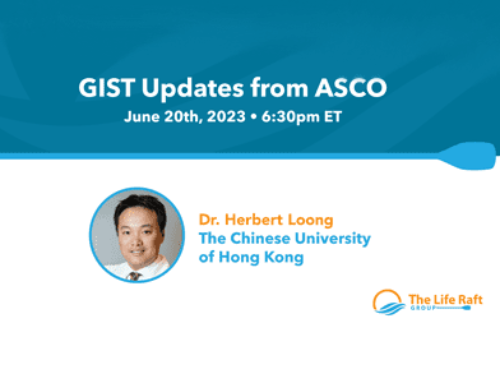Executive Director’s report focuses on better treatment options for GISTers
For my Executive Director’s report, I usually highlight the many accomplishments of the Life Raft Group. Some of which include:
- Launching a GIST Day of Learning program in Miami, which is being expanded in 2013
- Using our GIST Collaborative Tissue Bank to help physicians in Latin America identify misdiagnosed GIST cases
- Major presentations to the FDA, FasterCures & CTOS
- Helping to restore $1 million in cancer research funding to New Jersey’s budget
- Our Research Team making several breakthroughs in the search for a cure
- Debuting features like a new and improved website and mobile application
Now I would like to focus on our future, so I am going to direct your attention on personalized medicine—a myth or reality—and begin a dialogue about its impact upon GIST patient survival.
Personalized Medicine
Question: Myth or Reality?
Answer: Unfortunately, myth.
Let me explain:
We have the mutational testing tools to categorize many different subtypes of GIST. We have a growing body of evidence to optimize treatments based upon knowing such subtypes. Despite this, few GIST patients in the United States receive mutational testing.
The LRG is determined to make personalized treatment for GIST a reality.
Throughout time there have been enormous time gaps between the discovery of new ideas and the systematic implementation of these ideas. We have seen some fairly extraordinary examples of this in the world of medicine.
We’ve seen this in breast cancer. How long after the introduction of the lumpectomy did it take for this option to be considered instead of radical mastectomy? Too long.
We find the same issue in lung cancer. How long did the public wait for the admission that smoking damages your health? How many decades went by before the statement “Smoking causes lung cancer” was legally required on every pack of cigarettes? Again, too long.
While the world waited for these discoveries to become common knowledge, patients suffered, some even died.
The past decade has seen enormous breakthroughs in the molecular characterization of different cancers with GIST leading the way.
Here is what we know: GIST patients can be categorized by a range of mutations like exon 11 or 9. These subtypes can have different response rates to different dosage levels or treatments.
For example, approximately 10 percent of GIST patients have a KIT exon 9 mutation. This type of GIST has been found to respond better to higher doses of Gleevec.
Even more telling, approximately five percent of GIST patients have a D842V PDGFRA mutation which is totally resistant to Gleevec. Following surgery, these patients are routinely prescribed three years adjuvant Gleevec (standard care) because they have not had a mutational test. Further, without mutational testing, these patients are unaware of mutation-specific trials like AROG’s crenolanib trial.
Nearly every type of GIST has potential for optimizing treatments based on mutation type.
Mutational testing has been readily available for several years. The process of obtaining tissue for mutational testing is a relatively simple one. Several laboratories perform the test on routinely collected tissue following surgery. In fact this testing is free of charge through the LRG Tissue Bank or directly shipped to Oregon Health & Science University.
Let me recap: We know that several GIST subtypes require non-standard treatment. We know that this testing is fairly easy to have done and is often free of charge.
But we also know that, according to a recent report, the total number of GIST patients receiving such mutational tests is six percent1.
The LRG thinks this is unacceptable and we hope you do too.
We will bring you more information about what is going on, how it impacts the survival of GIST patients and what we can do about it. In the meantime, you can take a stand with us and join the LRG Patient Registry & Tissue Bank to get mutational testing free of charge.



